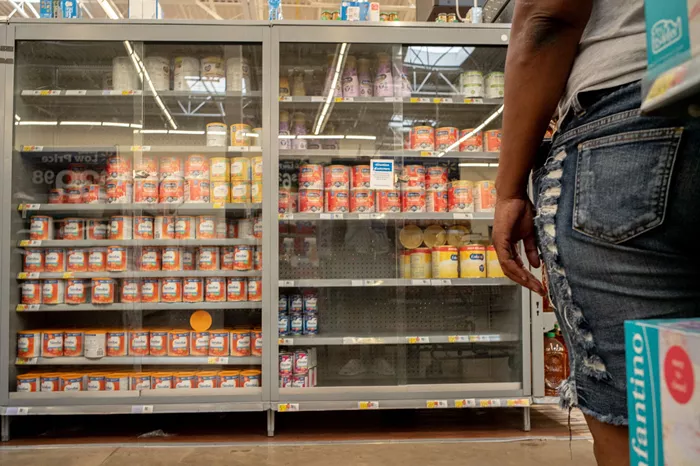Earlier this month, federal officials announced a new initiative aimed at improving the safety and nutrition of baby formula in the U.S. The initiative, called “Operation Stork Speed,” brings attention to the current state of formula production and regulation, raising questions for parents about which products they should trust for feeding their children.
The initiative includes commitments to review the nutritional content of baby formula and increase testing for heavy metals and other contaminants. The Department of Health and Human Services (HHS) and the Food and Drug Administration (FDA), which falls under HHS, are spearheading this effort.
HHS Secretary Robert F. Kennedy Jr., known for his independent presidential bid and “Make America Healthy Again” slogan, is leading the initiative. His agenda closely aligns with President Donald Trump’s messaging but also reflects a growing skepticism about government oversight, which may raise concerns among some parents about the initiative’s impact.
Dr. Steven Abrams, a pediatrician at the University of Texas at Austin, sees the initiative as beneficial. “It’s always good,” he said. “Infant formula has always needed regular and frequent review.”
Currently, infant formula in the U.S. is tightly regulated to ensure safety. These regulations stem from a decades-old law that is periodically updated. The FDA ensures compliance with sanitary controls, nutritional adequacy, and proper packaging and labeling. However, public health advocates argue that improvements are still needed, especially following the 2022 formula shortage, which was partly caused by a bacterial contamination at a Michigan production facility.
Abbott Nutrition, which operated the affected plant, recalled several powdered formula products during the shortage. Later, the FDA reported that as many as nine children may have died from infections linked to the contaminated formula, although the link could not be confirmed due to testing limitations.
The shortage highlighted how a few companies dominate the formula market, a situation that persists today. In response, former President Joe Biden’s administration introduced new oversight measures, expanded the import of formula, and passed legislation to increase competition in the market. The FDA’s long-term strategy, released in January, aimed to improve the resiliency of the formula market by focusing on preventing contamination and enhancing communication with manufacturers.
However, since returning to office, Trump has made significant cuts to the federal workforce, including at the FDA. Despite this, Kennedy’s department has taken steps to ensure that inspection roles remain intact, though voluntary buyouts were offered to most HHS employees.
Kennedy’s plan aims to strengthen the safety and accessibility of infant formula, which is essential nutrition for many babies between birth and 12 months. Public health experts argue that part of the problem is a lack of government support for nursing parents, which has led to increased reliance on formula.
“The FDA will use all resources to ensure formula products are safe and nutritious for families,” Kennedy said after meeting with leading formula manufacturers.
One key area of focus is the nutritional content of infant formula. The FDA currently requires 30 essential nutrients, though this list is updated periodically. Dr. Abrams suggests that the nutrient requirements may need to be revised to reflect new research, particularly for premature babies.
Kennedy has also expressed concerns about the presence of toxic metals in some formulas, an issue that has gained attention from lawmakers and the FDA. A recent report by Consumer Reports found traces of toxic chemicals such as arsenic, lead, and BPA in certain powdered formulas. However, half of the formulas tested showed low or no levels of these contaminants.
Sana Mujahid, a researcher at Consumer Reports, emphasized that while these results raise concerns, many formulas are still safe for babies. She urged parents to consider the results carefully when choosing a product.
Public health experts recommend that parents consult their pediatricians if they have concerns about formula quality and avoid making homemade formula, which may lack necessary nutrients.
The formula shortage has also created an opportunity to address long-term solutions. Laura Modi, CEO of the infant formula company Bobbie, noted that the industry is moving from addressing crises to finding sustainable solutions.
However, some food safety advocates are concerned about the potential impact of recent federal budget cuts. In February, the FDA’s top food safety official resigned, and a key committee at the Agriculture Department was disbanded. Critics argue that cutting resources for food safety inspections could compromise the safety of infant formula.
Jill Rosenthal, director of Public Health Policy at the Center for American Progress, warned that reduced inspection capacity
could undermine efforts to ensure formula safety. An audit of the FDA’s response to the Michigan contamination revealed inadequate policies and procedures for identifying risks to formula.
Dr. Abrams also raised concerns about how changes to the formula industry could affect low-income families. Half of the formula sold in the U.S. is distributed through the WIC program, which supports low-income women and children. He stressed that WIC families should be involved in any changes to formula nutrition requirements and that any proposed changes should be based on scientific evidence.
Modi, who attended a meeting with Kennedy and other formula manufacturers, expressed optimism about the commitment to quality and safety. She emphasized the importance of collaboration between the government and private sector to make meaningful changes.
“This is a very regulated market,” Modi said. “The FDA, the government, and the private sector need to work together to ensure progress.”
As the initiative unfolds, parents and public health experts will be watching closely to see if the changes lead to improved safety and access to infant formula.
Related Topics:


